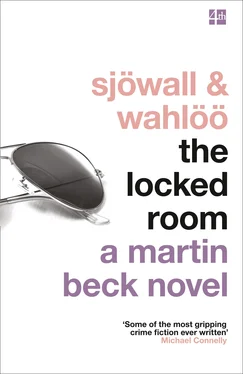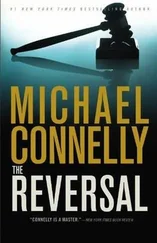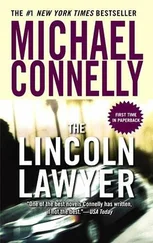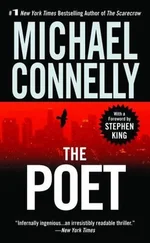The next witness, a woman, was a boutique owner. When she heard a shot she'd been standing in the open door of her shop, which shared a party wall with the bank. First she thought the sound had come from the pantry inside her boutique. Afraid that the gas stove had exploded, she dashed inside. Finding it hadn't, she returned to the door. Looking down the street, she'd seen a big blue car swing out into the traffic – tyres squealing. At the same instant a woman had come out of the bank and shouted that someone had been shot. She hadn't seen who had been sitting in the car or what its number was, but she thought it looked more or less like a taxi.
The third witness was a thirty-two-year-old metal worker. His account was more circumstantial. He hadn't heard the shot, or at least hadn't been aware of it. When the girl emerged from the bank he'd been walking along the pavement. She was in a hurry, and as she passed had pushed him aside. He hadn't seen her face but guessed her age to be about thirty. She was wearing blue trousers, a shirt, and a hat and was carrying a dark bag. He'd seen her go up to an ‘A’-reg car with two threes on its number plate. The car was a pale beige Renault 16. A thin man, who looked something between twenty and twenty-five, had been sitting at the wheel. He had long, lank, black hair and wore a short-sleeved cotton T-shirt. He was strikingly pale. Another man, who looked a little older, had stood on the pavement and opened the back door for the girl. After closing the door behind her, he sat down beside the driver in the front seat. This man was strongly built, about five foot ten, tall, and had ashen hair – fuzzy and very thick. He had a florid complexion and was dressed in black flares and a black shirt of some shiny material. The car had made a U-turn and disappeared in the direction of Slussen.
After this evidence Gunvald Larsson felt somewhat confused. Before calling in the last witness he carefully read through his notes.
This last witness turned out to be a fifty-year-old watchmaker who'd been sitting in his car right outside the bank, waiting for his wife who was in a shoe shop on the other side of the street. He'd had his window open and had heard the shot, but hadn't reacted since there's always so much noise on a busy street like Hornsgatan. It had been five past three when he'd seen the woman come out of the bank. He'd noticed her because she seemed to be in too much of a hurry to apologize for bumping into an elderly lady, and he'd thought it was typical of Stockholmers to be in such a rush and so unfriendly. He himself came from Södertälje. The woman was dressed in long trousers, and on her head she'd been wearing something reminiscent of a cowboy hat and had had a black shopping bag in her hand. She'd run to the crossroads and disappeared around the corner. No, she hadn't got into any car, nor had she halted on her way, but had gone straight on up to the corner and disappeared.
Gunvald Larsson phoned in the description of the two men in the Renault, got up, gathered his papers, and looked at the clock. Six already.
Presumably he'd done a lot of work in vain. The presence of the various cars had long since been reported by the first officers to arrive on the scene. Besides which none of the witnesses had given a coherent overall picture. Everything had gone to hell, of course. As usual.
For a moment he wondered whether he ought to detain the last witness, but dropped the idea. Everyone appeared eager to get home as quickly as possible. To tell the truth, he was the most eager of all, though probably that was hoping too much. So he let all the witnesses go.
Putting on his jacket, he went back to the bank.
The remains of the courageous gymnastics teacher had been removed, and a young constable stepped out of his car and informed him politely that Detective Inspector Rönn was waiting for him in his office. Gunvald Larsson sighed and went over to his car.
He awoke astonished at being alive. This was nothing new. For exactly the last fifteen months he'd opened his eyes every day with the same confused question: How is it I'm alive?
Just before waking he'd had a dream. This too was fifteen months old. Though it shifted constantly, it always followed the same pattern. He was riding. A cold wind tearing at his hair, he was galloping, leaning forward. Then he was running along a station platform. In front of him he saw a man who'd just raised a gun. He knew who the man was and what was going to happen. The man was Charles J. Guiteau; the weapon was a marksman's pistol, a Hammerli International.
Just as the man fired he threw himself forward and stopped the bullet with his body. The shot hit him like a hammer, right in the middle of his chest. Obviously he had sacrificed himself; yet at the same moment he realized his action had been in vain. The President was already lying crumpled on the ground, the shiny top hat had toppled from his head and was rolling around in a semicircle.
As always, he'd woken up just as the bullet hit him. At first everything went black, a wave of scorching heat swept over his brain. Then he opened his eyes.
Martin Beck lay quietly in his bed, looking up at the ceiling. It was light in the room. He thought about his dream. It didn't seem particularly meaningful, at least not in this version. Besides which it was full of absurdities. The weapon for example; it ought to have been a revolver or possibly a derringer; and how could Garfield be lying there, fatally wounded, when it was he himself who demonstrably had stopped the bullet with his chest?
He had no idea what the murderer had looked like in reality. If ever he'd seen a photo of the man, the mental image had been wiped out long ago. Usually Guiteau had blue eyes, a blond moustache, and sleek hair, combed back; but today he'd mostly resembled an actor in some famous role. Immediately he realized which: John Carradine as the gambler in Stagecoach. The whole thing was amazingly romantic.
A bullet in your chest, however, can easily lose its poetic qualities. That much he knew from experience. If it perforates the right lung and then lodges near the spine, the effect is intermittently painful and in the long run very tedious.
But there was also much in his dream that agreed with his own reality. The marksman's pistol, for example. It had belonged to a dismissed police constable with blue eyes, a blond moustache, and hair combed diagonally back. They'd met on the roof of a house under a cold, dark, spring sky. No words had been exchanged. Only a pistol shot.
That evening he'd woken up in a bed in a room with white walls – more precisely in the thorax clinic of Karolinska Hospital. They'd told him there his life was in no danger. Even so, he'd asked himself how it was he was still alive.
Later they'd said the injury no longer constituted a threat to his life, but the bullet wasn't sitting too well. He'd grasped, though not appreciated, the finesse of that little ‘no longer’. The surgeons had examined the X-ray plates for weeks before removing the foreign object from his body. Then they'd said his injury definitely no longer constituted any danger to his life. On the contrary, he'd make a complete recovery – providing he took things very easy. But by that stage he'd stopped believing them.
All the same, he had taken things pretty easy. He'd had no choice.
Now they said he'd made a complete recovery. This time too, however, there was an addition: ‘Physically.’ Furthermore he shouldn't smoke. His windpipe had never been too good, and a shot through the lung hadn't improved matters. After it had healed, mysterious marks had appeared around the scars.
Martin Beck got up. He went through his living room out into the hallway and, picking up his newspaper, which lay on the doormat, went on into the kitchen, meanwhile running his eyes over the front-page headlines. Beautiful weather, and it would hold, according to the weatherman. Apart from that, everything seemed, as usual, to be taking a turn for the worse. Setting down the newspaper on the kitchen table, he took a yoghurt out of the fridge. It tasted as it usually did, not good and not exactly bad, just a trifle musty and artificial. The carton was probably too old. Probably it had already been old when he'd bought it – the days were long gone when a Stockholmer could buy anything fresh without having to make a particular effort or pay an outrageous price. Next stop was the bathroom. After washing and brushing his teeth he returned to the bedroom, made the bed, took off his pyjama trousers, and began to dress.
Читать дальше












